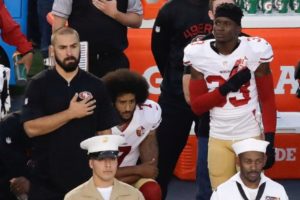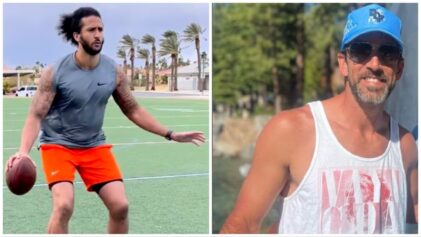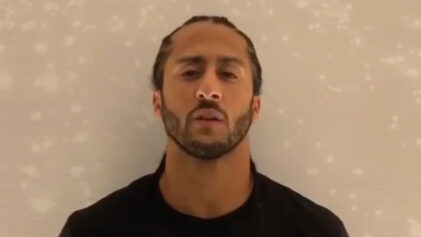
The 49ers’ Colin Kaepernick kneels during the national anthem in a protest of racial inequality. Credit Chris Carlson/Associated Press
On the 15th anniversary of 9/11, we are told that we must never forget. Yet under a false narrative that white Americans have imposed for that day, some lives and some forms of suffering are more forgettable than others. In a convenient fashion, they expect Black people to acknowledge the suffering of those deemed worthy of remembrance, which means not their very own. And so, we are told to stop being the victim, just get over it and stop whining, and toss our pain, grief and trauma into the dustbin of history.
The hashtag #NeverForget was trending on social media yesterday, and with good reason. While Americans across the country have insisted that we never forget the terror attacks that occurred on that day — and we should not, as thousands perished — the conversation about the suffering of Black people has been thrown into the mix, as these days, the nation is being forced to not forget the tragedies that have befallen Black folks as well.
Those who would rather not deal with a horrific past — and a deplorable present-day reality — of racial oppression and murder have created a false dichotomy: Either you must stand and engage in a pre-approved display of empty patriotism and flag worship — for a flag that never stood for you — or you take a knee for racial justice and human rights, and draw the ire of white America. Because how dare you, you ingrate, after everything this nation and the soldiers have done for you? Never mind that you built this nation.
In the latest iteration of Black protest, professional athletes, particularly NFL players, have followed the lead of Colin Kaepernick and refused to stand for the national anthem. That anthem, the “Star-Spangled Banner,” embodies America’s legacy of racial violence by glorifying slavery and rejoicing in the murder of runaway slaves who fought for the British in the War of 1812 — the failed U.S. land grab attempt at Canada. That anthem reminds us of the atrocities and crimes committed in the name of that flag — the genocide of Indigenous civilizations, the kidnap, torture and forced labor of African people, and all the wars waged in other lands. When Martin Luther King opposed the war in Vietnam, he called the U.S. “the greatest purveyor of violence in the world today,” and faced condemnation for it. But his words are just as poignant today as they were five decades ago.
Moreover, today’s Black athletes are carrying on the tradition of John Carlos and Tommie Smith — the courageous medalists at the 1968 Summer Olympics in Mexico City who raised Black fists in protest of racism back at home, of apartheid South Africa, and in support of Muhammad Ali, who refused to serve in the Army. As a result, the white media lambasted them and branded them as criminals, and they were ejected from the Olympics. After all, it was far easier, far more straightforward to dismiss these men and label them as Black Nazis than to actually listen to their grievances — much less address them.
Fast forward to today, and some Black athletes insist they cannot respect a flag that does not respect them, that continues to tolerate violence against Black people. Those diagnosed with white fragility insist that such displays of political protest are disrespectful to the memories of the men and women in the armed forces. However, such a false narrative fails to acknowledge the Black soldiers who were murdered by white supremacy, including the Black men who returned to the Jim Crow South after serving their country overseas, only to be lynched by the Klan while still in uniform.
That narrative fails to mention LaVena Johnson, a Black soldier who was raped and murdered on a U.S. military base in Iraq, a crime which was labeled a suicide and covered up by the Army? And what of those Black veterans such as Walter Scott who were killed by police violence? Will we forget these people who served their country? This is why an alternative vision of #NeverForget is emerging on social media:
#NeverForget the poverty, colonialism, and dictatorships the US govt supported in the ME that created the conditions for 9/11 to happen.
— William J Richardson (@HoodAcademic) September 12, 2016
We will #neverforget the racial injustice in this country and the anthem promoting killing slaves Katherine https://t.co/TYCWDye6PW
— BlackSportsOnline (@BSO) September 12, 2016
More Courageous Athletes speak out against injustice tonight #SNFonNBC #NeverForget pic.twitter.com/TvsAR2Czpw
— Gerald A. Griggs (@AttorneyGriggs) September 12, 2016
#Kaepernick didn’t disrespect the troops Bush did sending them to die in Iraq & lying about WMD #NeverForget pic.twitter.com/3bhmo4nrha
— Etan Thomas (@etanthomas36) September 12, 2016
RT @etanthomas36: I think a lot of ppl have misplaced their #patriotism
#Veterans #ColinKaepernick #NeverForget pic.twitter.com/fwL6ZnakRd— Doc Hamrick (@mch7576) September 12, 2016
#NeverForget #LaVenaJohnson…the U.S military covered up her murder, this is why we must never give up the fight. pic.twitter.com/6VDY1lHBOp
— Sυи σf M͛αℓ¢σŁм x̸ (@SunOfMalcolmX) September 12, 2016
#NeverForget #IndiaKager #WalterScott #AnthonyHill #KennethChamberlain #Kaepernick kneels for them too pic.twitter.com/05bP9J2CFE
— ChuckModi (@ChuckModi1) September 11, 2016
#NeverForget Sept.11. 1973, Chile. https://t.co/ogssyS12wN pic.twitter.com/T1hQqoB3dM
— teleSUR English (@telesurenglish) September 12, 2016
Surely, we must never forget. But that means we must never forget all of it. And as far as Black people are concerned, there is a lot to remember. For a people who have felt the lash of the whip for generations past and present, we have absolutely nothing to lose but our chains.


